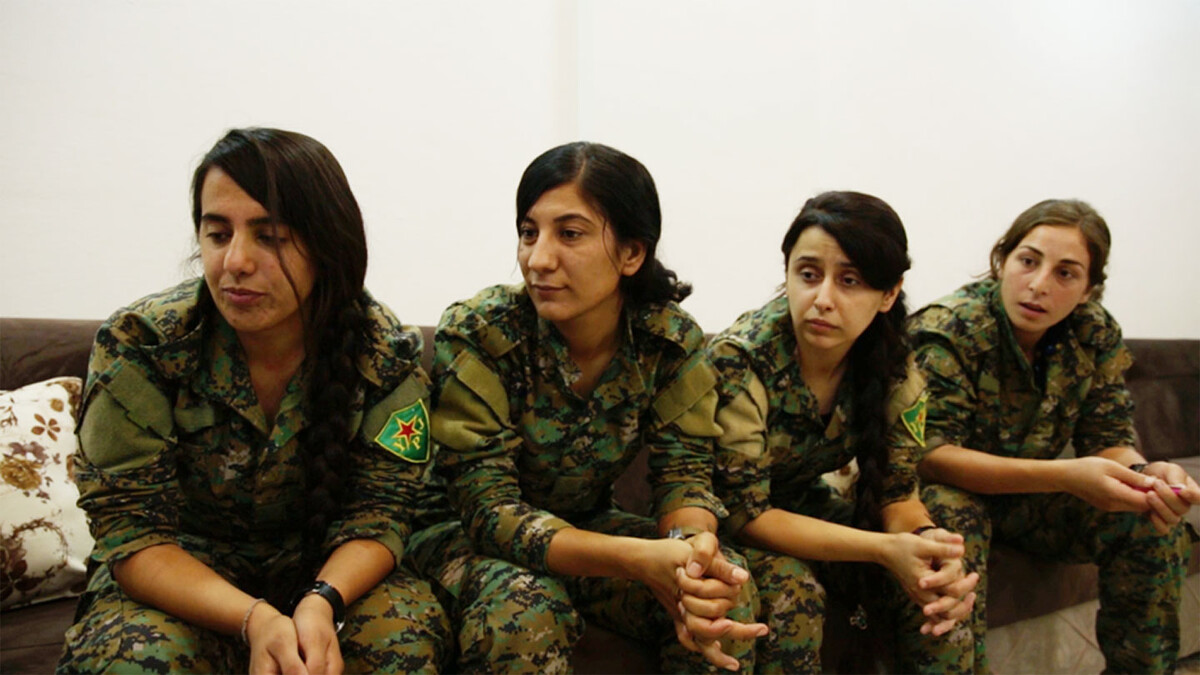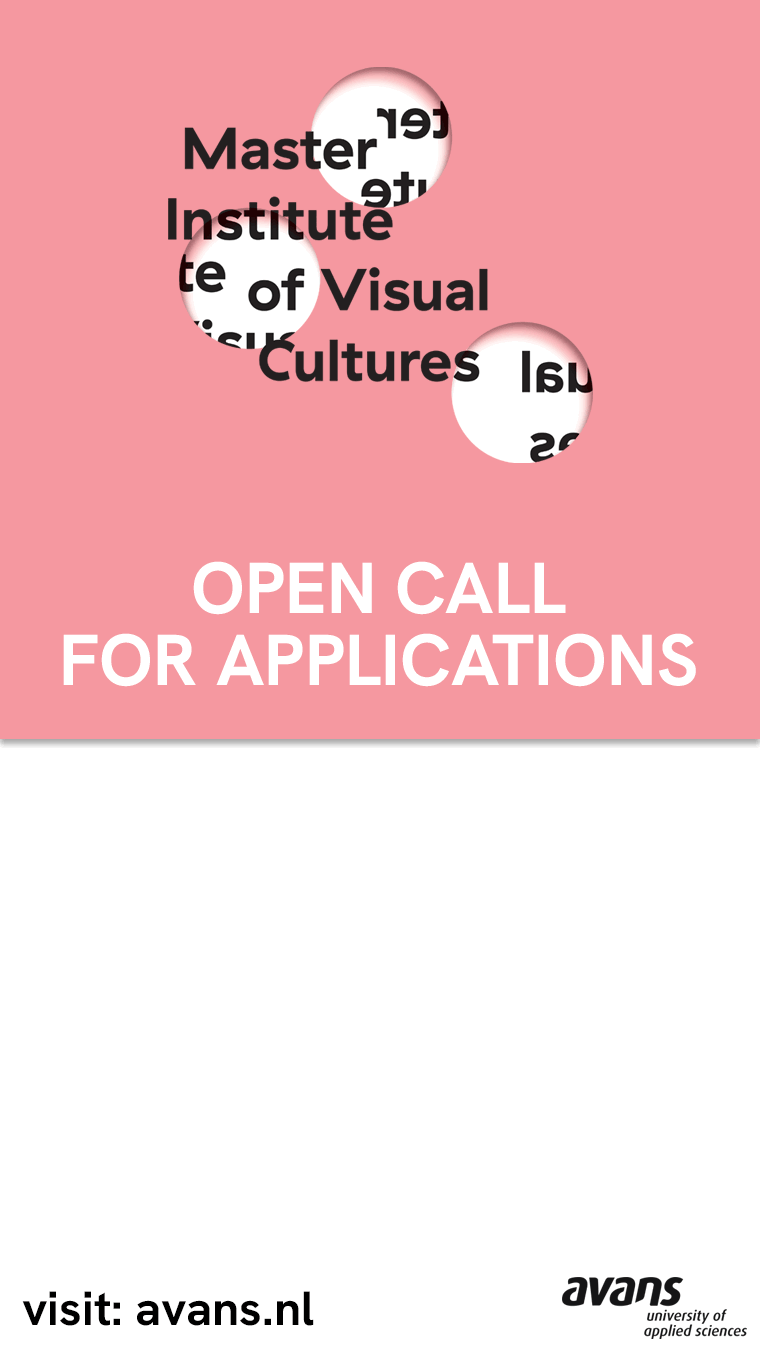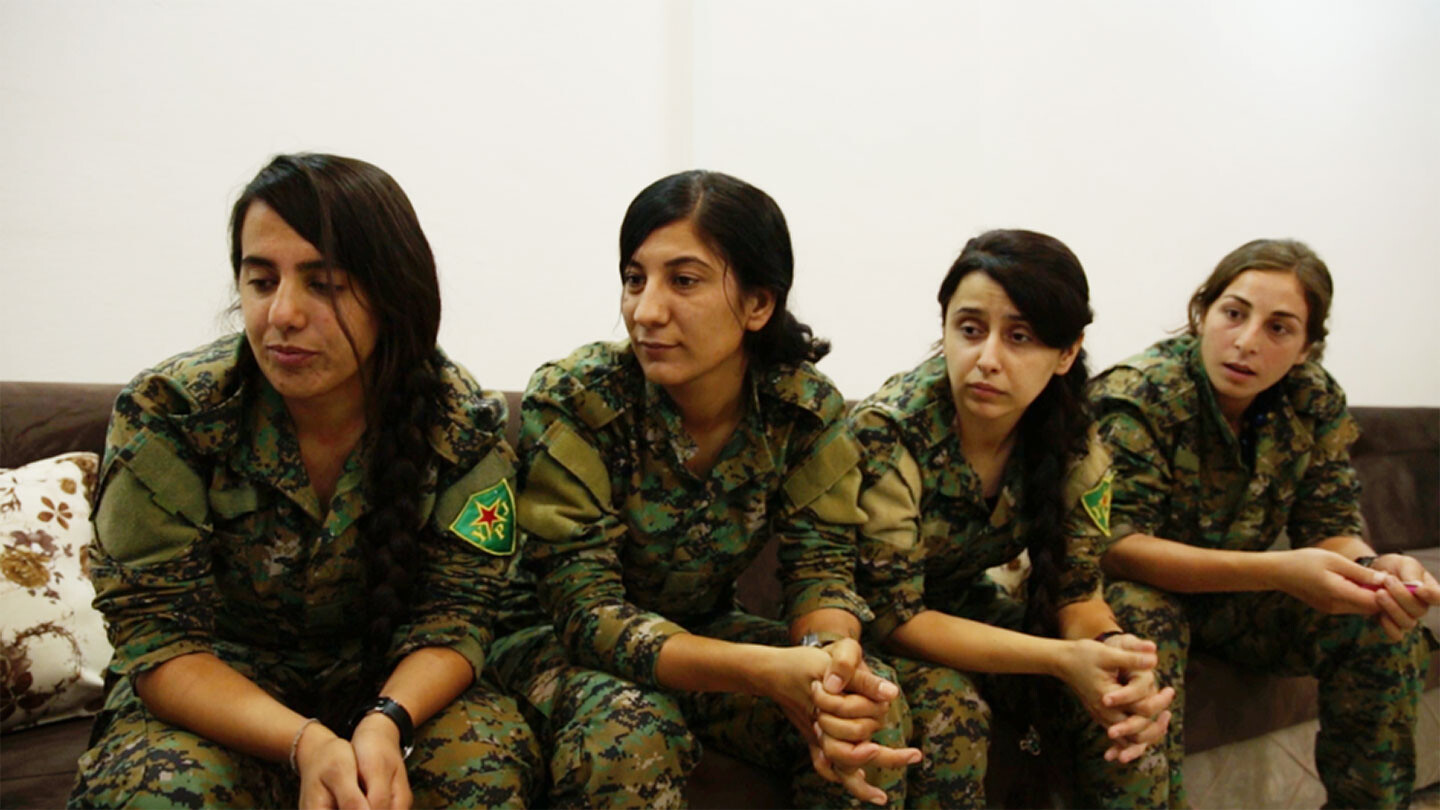This interview was conducted on July 31, 2017 with four commanders of the YPJ, or Yekîneyên Parastina Jin (Women’s Defense Units), an all-female military organization in Rojava. The commanders’ names are Dilovan Kobani, Nirvana, Ruken, and Zerin.1
Rojava Film Commune and Hito Steyerl: We would like to thank you for agreeing to talk to us, in this important and difficult time. As you know, the hundredth anniversary of the October Revolution is approaching. We think you are continuing the legacy of the October Revolution in a very different way. The October Revolution began as a women’s protest. On March 8, 1917, tens of thousands of women in St. Petersburg demonstrated with banners for bread for children. They were women of all classes—farmers, female students, and later also textile workers. The dynamics of the uprisings, which began on that day, led to the revolution in November of the same year. What would you like to say about this?
Dilovan Kobani: In its beginning the October Revolution was kicked off by women, but soon after it succeeded, men took the power and pushed the women out. But in our case we (as women) formed an independent force. In the YPJ we are independent. We lead our armed force and political force ourselves. We do not carry out our revolution in the shadow of men. Our revolution is independent.
Women from all around the world are gathered here with us. German, Iranian, American—women from all nations joined us. And together we work on the revolution.
Zerin: The October Revolution was based on an economic premise. We don’t need to go into historical details, but generally the main difference is the political foundation. In all countries and everywhere there are armies, right? And sometimes women also take part in these armies. But in our example, the women’s force, the YPJ, is independent and our life, our fight, and our goals stand for this.
Women took part in every stage of the October Revolution. This cannot be denied. Women always played a role. Their effort is impossible to erase. And we consider ourselves their followers. But we have also realized that there are things we can criticize on a political level, and we have worked to improve these things.
What things? After the revolution was achieved, men said, there is no role women can play anymore. They excluded women. But in our example, women are even more visible and active than men. Because we do not want to repeat the same mistakes that were made back then.
After the collapse of real socialism, the remnants redeveloped as individual states. And these states fell under the influence of capitalist modernity. We are against this system of capitalist modernity, because we are socialists. This is vital for us: we do not want to become a state in the future. Because if we were to become a state, the role of women would disappear. Women’s influence would disappear. Women would not be able to be fully active. We would like to make this life more beautiful through the color of women. Through the color of women, we would like to establish equality.
If women don’t take part in a revolution, then that revolution is useless.
Without women, our revolution would collapse just like real-existing socialism.
Because women are leading, this revolution will survive.
Nirvana: The pioneers were Clara Zetkin, Rosa Luxemburg, and Alexandra Kollontai. They worked for revolution but they remained in the shadow of men. Stalin disregarded women. These women revolted, but they couldn’t form a movement. There was no sufficiently strong organization among women. And there was no armed power of women. For this reason, this system fell apart easily.
We are correcting their mistakes in our practice. Even when they were walking towards the gallows, some of the women said, if we can be sent to the gallows, we should have the right to vote and be elected one day. But women restricted themselves by pursuing an electoral perspective above all else.
With the YPJ, our perspective has also become more universal. There are women from all nations and classes coming here and fighting. They know exactly what they are fighting for.
RFC and HS: What does it mean to fight for all humanity? While people are in their warm beds, young women and girls are literally crawling through barbed wire to join you to fight “for humanity.” Why do you say that you fight for all humanity? Why keep up this internationalist tradition while many great powers isolate themselves and incite various groups of people against one another—and while many Western leftists retreat into ethno-identitarian or nationalist ideology?
DK: If we were fighting only for the benefit of just one nation, we would have been done by now. It would have been so easy. But our revolution is not only for Kurds. Look at Daesh. It is not only a danger to Kurds. Daesh has posed an enormous danger to the world as a whole. But no one in the world could stand in its way. We as the YPG [Yekîneyên Parastina Gel; People’s Defense Units] and the YPJ blocked it via a revolutionary war, and this revolution was recognized. Yes, we are fighting for all humans, and the whole of humanity is also fighting with us. This revolution doesn’t only belong to Kurds. This revolution is not only about the revolution of Kurdish women. This revolution is the revolution of women throughout the world. We are continuing Rosa Luxemburg’s fight. If this was only for a nation, it wouldn’t be called “revolution.” We are waging this revolution for everyone. For people that are oppressed, for the women murdered in Sinjar, for the women oppressed in Europe and elsewhere. If today an Iranian woman is raped by a man and executed for this reason, I will ask for her rights.
We started this revolution for humanity. And for this reason humanity started joining us. And from now on, this will continue and grow stronger. As the YPJ, we say, wherever Daesh goes, we will go after them, we will not let them go. Wherever Daesh wages a war, we will take a stand against it as the YPJ.
Fighting for humanity is a big honor for us. We started this revolution for everyone, and we will continue. Until all women are free, we will continue our fight, we will not rest.
RFC and HS: In the YPJ, women from different places are active. How does everyone live together?
Zerin: Actually, it is not that difficult. Among us, there are Arab women, Iranian women, Turks, Americans, Germans. Some were killed in combat, like our German friend Ivana Hoffman, as just one example. We share the same political beliefs. In this case it doesn’t matter where you come from. We live as equals. In our daily life, our education and training in fighting and tactics, we don’t have problems.
Sometimes we have language problems with understanding each other.
But because we accept each other and our lives and politics, there is a great love towards each other. For example, between Arabs or Iranians—or no matter which nation—when there is pain and trouble, we can overcome them because of common sympathy.
There can be psychological or physical difficulties. But it is not difficult to live together, because we fight for the same thing, we live for the same thing.
RFC and HS: What can we learn from your way of living together?
Nirvana: Communality, women’s organization, women’s bravery and willpower. When women become more conscious, the fear in them disappears. When fear disappears, women become rebellious. They wonder about and research their history. They reclaim their history. What we are doing here is looking for our history that has been left in the dark for so long.
Ruken: Until now, no one initiated a revolution for women. Also, the history of women is not written truthfully. From the October Revolution until today, the true history of women should be revealed. It is true that women are fighting today on the frontlines, against Daesh and others. But without revealing the true history of women, our revolution might not bring full rights for women, just like the October Revolution.
A male voice: It would be nice if you could talk a little bit about the influence of the YJP over Rojavan society itself.
Ruken: Yes. We tried to explain that in the beginning. Over society, over men, over your mentality, too. [Laughter] Don’t worry about it! … It is all happening, slowly.
RFC and HS: What do you want for the future?
Zerin: As revolutionaries, as an army of women, of course our desire is equality, permanent equality. Not only for Kurds and their land, not only for the Middle East, but for the whole world. Because the pride of humanity is one, and in our times, it’s trampled under foot. No one should be ruling, no one should be oppressed. We would like the whole world to know about our philosophy and politics.
Nirvana: As a friend stated, we would like to spread our paradigm, a women-oriented ecological democracy, to every corner of the world, from Asia to Europe to Africa, especially among women.
DK: We share more or less the same ideas: establishing equality in the world until everyone is free and equal. When we say freeing people, we mean that men aren’t free either because of their mentality. Removing this patriarchal mentality is freeing all of humanity, and this is our main purpose for the future. And we will pursue this until the end.
[Laughter]
Note: I am just filling in here, as many of my journalist friends who would be much better equipped to do political interviews are in Turkish jails. Unfortunately, many Turkish professionals have been arrested, forced into exile, expropriated, and intimidated. As soon as Zehra Doğan, Meşale Tolu, Ahmet Şık, Ömer Çelik, Seyithan Akyüz, Akın Atalay, Kemal Sancılı, and Deniz Yücel (to give just a random and incomplete list) and all others are freed, I promise I will go back to writing about JPEGs or VR. Please support the freedom of journalists, writers, artists, and liberal and leftist activists in Turkey, or you will have to endure more terrible journalism. —Hito Steyerl
Category
Subject
Translation by Reşit Ballikaya, Baran Yoldas. Thank you to Şêro Hindê and Rojava film Commune.


